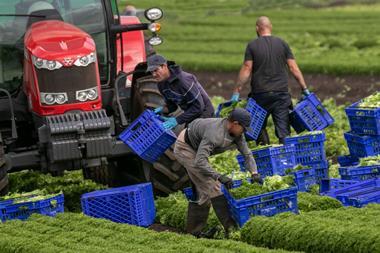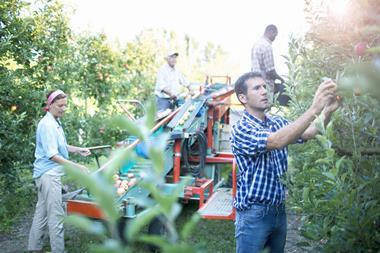
Growers have expressed concern over the continuing lack of clarity regarding new rules that would require them to pay additional costs for seasonal labour, including travel.
The new proposed rules from the Supplier Ethical Data Exchange (Sedex) will require farming and growing businesses to pay for the recruitment and transportation fees of the seasonal workers they employ. Sedex is a standard that is widely backed by all major UK supermarkets, who demand growers are signed up to the scheme before their products are listed.
The proposals, which are expected to come into force this summer, could cost the industry up to £90m a year, according to some estimates, as well as posing significant logistical challenges for the entire sector.
“I don’t think there is enough thought in the commercial impact and equally I don’t think there is enough consideration in the operation of impacts and how this could actually be delivered in reality,” said James Mallick, director of seasonal worker scheme operator Fruitful Jobs.
Mallick estimated the cost would come in at a minimum of £60m for the sector, “and that’s only the seasonal worker industry, any such change to employee-based principles needs to cover the entire workforce”.
He added the actual number would likely be far higher and suggested it would be difficult to pay for.
Vegetables to cost more amid continued tighter supply, grower warns
Nick Marston, chair of the British Berry Growers Association, predicted it was going to cost between £45m and £90m “if you account for between £1,000 and £2,000 per worker”.
“How on earth would it be paid for?” he asked.
One source told The Grocer there had been a lot of confusion because “the standard itself is not very clearly written” about what the costs would include. It is currently unclear whether growers may also be required to cover illegal agency fees often incurred by workers in their home countries.
“If there’s a requirement, the buyer will ultimately dictate what happens and it could be that they dictated in a way which puts all of the cost all of the pressure on a supplier or potentially removes that supplier from their supply base,” he said.
There are hopes it will become clearer when Sedex publishes its guidance for auditors on how to audit the new standard.
He added that Sedex did not seem “swayed by the strength of response they’ve had”.
“It is a global standard. However, worker welfare regulations are already tight in the UK and in our case it will end up just adding cost and complexity, whereas in other countries, it may genuinely help improve conditions for workers.”
However, Mallick expressed concerns that it could increase exploitation if it drove more food production abroad rather than decreasing exploitation as it was designed to.
The source explained that it was likely that the retailers would not be enforcing this element of the standard. However, the retailers could still enforce it at a later date, which could put suppliers at risk as “growers will effectively have a non-conformance against the standard”.
There are concerns that retailers could use this non-conformance as the reason to delist suppliers unfairly.
“Retailers and their suppliers have been part of the Sedex consultation on the new SMETA methodology which is designed to strengthen remediation of systemic issues such as child labour and debt bondage,” said Sophie De Salis, sustainability policy advisor at the British Retail Consortium. ”We look forward to continuing working with Sedex and our suppliers throughout the food supply chain, to ensure this supports the collaborative efforts the industry is working towards.”
Most UK supermarkets buying more British apples and pears compared with last season
The Grocer understands a number of retailers and UK suppliers are engaged with The Food Network for Ethical Trade Responsible Recruitment Working Group, to understand the challenges of applying the ILO’s Employer Pays Principle and to identify ways to move this forward without negatively impacting the supply chain.
The NFU called for a pause to the proposals until there was a proper industry consultation, alignment on how it would be fairly implemented and with the financial cost impacts and risks to farming and growing businesses fully understood.
Mallick echoed these calls as “I just don’t think anybody knows the commercial or operational answers”.
Marston added: “We are supporting the NFU in their request that we actually put that on pause while we have a proper consultation as to what the implications of that are, how it’s going to be paid for and the practicalities of it.
He said workers were not tied to any one farm when they arrived so the practicalities of enforcing this were “really difficult”.
“What’s really concerning is that this does appear to be a UK gold plating job from Sedex on this occasion as that requirement is certainly not being enforced in other geographies,” he added.
The Grocer approached Sedex for additional comment.



















No comments yet